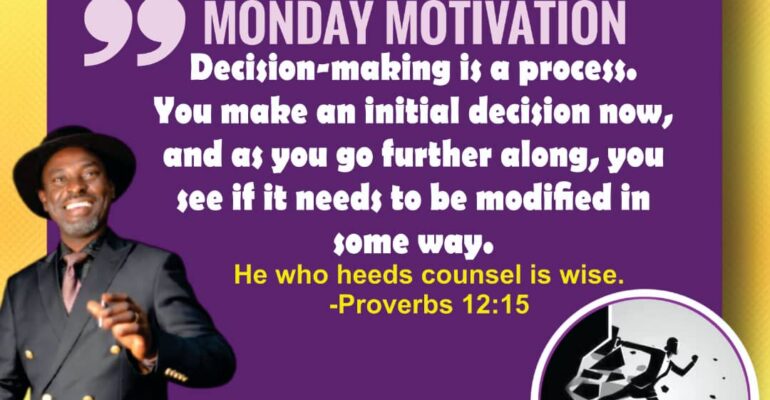The Art of Decision-Making: A Proverbial Guide to Wisdom
October 9, 2023 2023-10-09 6:56The Art of Decision-Making: A Proverbial Guide to Wisdom
Introduction
In the complex tapestry of life, decision-making is a skill that profoundly influences our journey. Each choice we make sets us on a particular path, and the process of decision-making is seldom a one-time event. Instead, it is a dynamic process that evolves as we gather information and navigate the twists and turns of life. Proverbs 12:15 offers timeless wisdom by encouraging us to understand that decision-making is indeed a process, one where initial decisions may need modification as we gain further insights and understanding.
The Nature of Decision-Making
Decisions, both big and small, shape our lives. Whether it’s choosing a career path, making financial investments, or deciding what to have for dinner, our choices have consequences. Understanding that decision-making is a process helps us approach it with greater wisdom and humility.
- Initial Choices: When faced with a decision, we make an initial choice based on the information and circumstances available at that moment. These decisions are like stepping stones, guiding us forward.
- Ongoing Evaluation: As we move forward in life, we gather new information, experiences, and perspectives. These can challenge our initial decisions and prompt us to reevaluate our choices.
- Adaptation: The ability to adapt and modify our decisions is a sign of wisdom. It demonstrates our willingness to grow, learn, and make changes when necessary.
- Complex Interactions: Life is not always straightforward. Decisions are often interconnected, and the consequences of one choice may impact subsequent ones. This complexity underscores the importance of an evolving decision-making process.
Proverbs 12:15 in Action
Proverbs 12:15 advises that “The way of a fool is right in his own eyes, but a wise man listens to advice.” This proverb emphasizes the importance of seeking counsel, remaining open to feedback, and being willing to adjust our course when necessary. Here’s how this wisdom can be applied to decision-making:
- Seek Counsel: Don’t hesitate to seek advice from trusted friends, family members, mentors, or experts when facing important decisions. Their insights can provide valuable perspectives you may not have considered.
- Embrace Humility: Recognize that you may not always have all the answers. Embracing humility allows you to accept that your initial decisions may need modification as you gain new insights.
- Learn from Mistakes: Accept that mistakes are a natural part of the decision-making process. Instead of dwelling on them, view them as opportunities to learn and grow.
- Stay Flexible: Be open to adapting your decisions as circumstances change or as you gain a deeper understanding of the situation. A flexible approach allows you to navigate life’s complexities more effectively.
- Reflect and Evaluate: Periodically review your decisions and their outcomes. Are they still aligned with your goals and values? If not, consider modifications.
Conclusion
Proverbs 12:15 invites us to view decision-making as an ongoing, adaptive process rather than a one-time event. Wisdom lies not only in making the initial choice but also in our willingness to listen, learn, and adjust along the way. By seeking counsel, embracing humility, and staying flexible, we can navigate life’s twists and turns with greater insight and grace. Ultimately, it is through this dynamic approach to decision-making that we cultivate wisdom and steer our lives toward paths of purpose and fulfillment.



